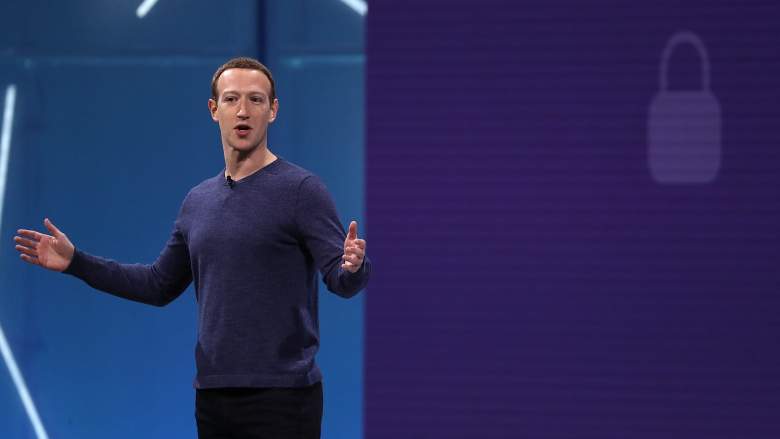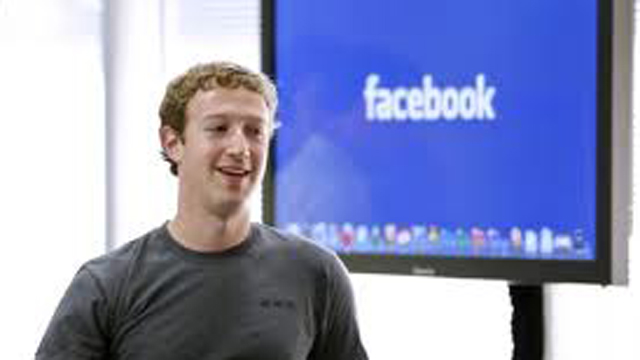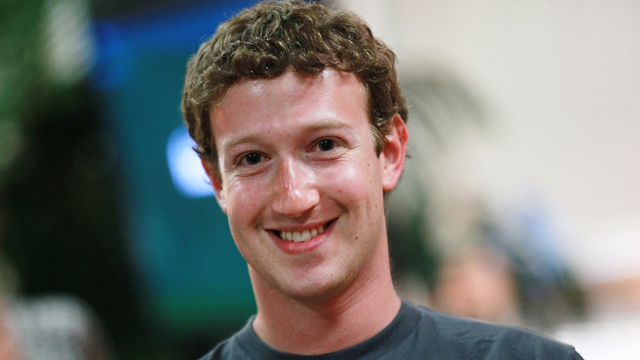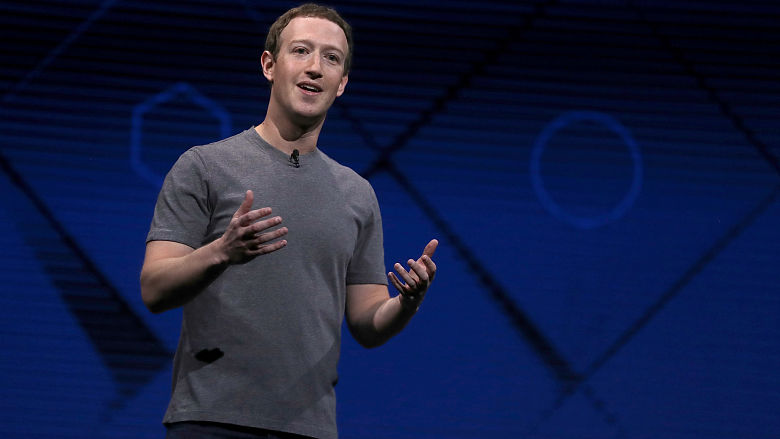
Getty Mark Zuckerberg Facebook CEO / Getty Images
Mark Zuckerberg Net Worth in 2018: $72.3 Billion
Mark Zuckerberg, founder and CEO of Facebook, is worth $72.3 billion, according to Forbes. He was the youngest self-made billionaire in history when Facebook went public when he was 23-years-old, and since then he’s ranked highly on many lists. He was number 13 on Forbes 2018 Most Powerful People list, number five on the 2018 World’s Billionaires List, number four on the Forbes 400 in 2017, number three on the Forbes Richest In Tech list in 2017, and number one in 2016 on the America’s Richest Entrepreneurs Under Age 40, Global Game Changer, and the Richest Person In America’s 50 Largest Cities lists.
Zuckerberg’s career has not been without controversy. The 34-year-old first faced criticism for stealing the idea for Facebook from the Winklevoss twins, then for kicking out partner Eduardo Saverin. More recently, he’s drawn scrutiny for Facebook’s role in spreading fake news and influencing elections and events abroad.
Still, despite controversy, Facebook stock has soared over the years, and Zuckerberg has profited. He spends his money on a large real estate portfolio and expensive t-shirts, but has vowed along with wife Priscilla Chan to donate 99 percent of his wealth. His life has inspired thousands of articles, a few books, and even a movie: The Social Network.
Here’s what you need to know about Mark Zuckerberg’s net worth and how he makes his money:
1. He Made His First Million by Age 22
Zuckerberg founded Facebook in his Harvard University dorm room, after tinkering with a few similar sites. He had been interested in computers from a young age, and created Zucknet, a messaging platform created with Atari BASIC, when he was 12-years-old. The chat service was mainly used by his father, who implemented it at his dental practice so receptionists could alert him when he had a new patient.

GettyGetty
After working with David Newman, a computer tutor, Zuckerberg started attending graduate classes at Mercy College, and eventually at Phillips Exeter Academy. He next created something called Synapse, which was like an early version of Pandora. Though Microsoft and AOL both thought about buying the service, Zuckerberg didn’t sell.
At Harvard, he built CourseMatch, a program that helped students choose classes. Next he built Facemash, where students could vote on two different faces of people on campus and choose who was more attractive. It was soon banned by the university. Soon, he was known as a software whiz and Cameron and Tyler Winklevoss asked him to help build something called Harvard Connect, which would be a dating site. Zuckerberg agreed to help, but soon stopped working on Harvard Connect in favor of starting his own, similar site called The Facebook.
In 2004, Zuckerberg dropped out of Harvard to focus on Facebook full-time. The move worked, and in 2005 Accel Partners invested $12.7 million into the company. Peter Thiel, founder of PayPal and other companies, also invested. By December of that year, Facebook had 5.5 million users.
Notably, Eduardo Saverin, Zuckerberg’s friend and co-founder, footed the bill for the inital Facebook servers. The pair faced tension as soon as Zuckerberg dropped out of school, according to this Business Insider narrative of the friendship, and it hit a breaking point when Facebook needed funding. Zuckerberg decided to cut Saverin out of the company by creating a new company to acquire the old company, then distributing shares to everyone in the new company except for Saverin.
“Is there a way to do this without making it painfully apparent to him that he’s being diluted to 10%?” Zuckerberg wrote in an email to his lawyer?
He went ahead with the plan in July 2004, and Saverin found out he’d been diluted in 2005. A legal battle ensued, as well as a personal one. Saverin set out for Zuckerberg’s reputation in a string of interviews, eventually catching the attention of Ben Mezrich, the author who wrote the book that was eventually made into The Social Network.
Despite all this, Facebook continued to grow, expanding away from colleges and to the public. Companies were eager to advertise on the social networking platform, but Zuckerberg declined potential advertisers like Yahoo! and MTV, preferring to keep the site ad-free. (The network did start accepting advertising in 2007).
In 2006, the Winklevoss twins said Zuckerberg stole their idea, and Zuckerberg ended up paying them $65 million in a settlement. Despite this, in 2007 Microsoft paid $240 million for a 1.6 percent stake in the company.
In 2010, Zuckerberg got another financial boost when Goldman Sachs and Digital Sky Technologies invested $500 million in Facebook. After these investments, the company was valued at $50 billion and people started to speculate that it would soon go public.
2. And by Age 28 He Was a Billionaire
Just after his 28th birthday in 2012, Zuckerberg took Facebook public. It wasn’t an immediate success. Because of technical issues, Facebook didn’t start trading until 11:30 a.m., and dropped to $38 per share from an initial $42.05. Investors were worried. Zuckerberg’s worth dropped from $19 billion to $17 billion in one day, and within the quarter it had fallen to $11.9 billion. Still, it was the biggest technology IPO in history, according to Fortune.

Getty
Since then, Facebook and Zuckerberg have more than recovered. Stocks are up 282 percent since the IPO and Facebook has 1.3 billion users–about 50 percent more than in 2012.
Also since then, Zuckerberg has started selling space to advertisers and user information to companies, helping the company stay profitable. It had a revenue of $28 billion and an income of $10 billion in 2017, as well as a market cap of $426.5 billion. Every year since Facebook has gone public, Zuckerberg has added an average of $9 billion to his net worth, according to Fortune.
3. He Has a Large Real Estate Portfolio and His T-Shirts Are More Expensive Than They Look
Zuckerberg’s famous casual look of grey t-shirts and hoodies is actually somewhat expensive. According to GQ, his “uniform” is made up of Brunello Cucinelli, Elder Statesman, and J Crew items, meaning his t-shirts could be around $900 and his hoodies around $2000.

Getty
On the other hand, his cars are less expensive than you would expect from a multi-billionaire. He’s been spotted driving in a Honda Fit, a Volkswagen hatchback, and an Acura TSX, all of which cost under $30,000.
Then there’s his real estate portfolio, which is vast. He owns a 5,000 square foot Palo Alto home that he bough in May 2011 for $7 million. It has a “custom-made artificially intelligent assistant,” according to SF Gate. In 2012, he began buying up properties around the initial home. He spent more than $30 million to purchase four of the surrounding homes, which he planned to rebuild. A year later, he bought a townhouse in the Mission District of San Francisco, and added a greenhouse and other renovations totaling more than $1 million.
In 2014, he and his wife bought two properties in Kauai, Hawaii for $100 million. They’re on a 357-acre former sugarcane plantation, which the couple said they purchased to help preserve its natural beauty.
When he travels, he travels with security, which Facebook pays for. The company spent $5 million on security for Zuckerberg in 2015, and it’s estimated the costs were higher in 2017 as he took a tour across the United States.
4. His Net Worth Took a Dip After Facebook’s Privacy Scandal , but It Was Only Temporary
In March 2018, Facebook shares hit an eight-month low after the New York Times reported that data firm Cambridge Analytica accessed tens of millions of Facebook users’ data–87 million were alerted by Facebook after the breach. Within two weeks, shares dropped more than 20 percent and lost $90 billion in market value.
Zuckerberg was questioned on Capital Hill (where news outlets pointed out that he abandoned his grey t-shirt for once), and vowed to take greater responsibility for Facebook’s actions. Meanwhile, Cambridge Analytica declared bankruptcy. Moving forward, Facebook said it would no longer permit advertising based on third party data. It also allowed users to clear their histories.
Within a few weeks, stocks were back up, and according to Forbes by May they were trading just under an all-time high. They were up 23 percent since the March scandal, and Facebook brought in $12 billion in the first quarter of 2018–that’s 49 percent higher than the same quarter in 2017.
In March, Business Insider reported that Zuckerberg’s worth was down $5 billion. Since, it’s risen by $13 billion.
5. He and His Wife Have Pledge to Rid the World of “Every Disease” Through a Massive Donation to Science
Zuckerberg and wife Priscilla Chan (who has been dating since they both attended Harvard University) founded the Chan Zuckerberg Initiative, a “philanthropic organization that brings together world-class engineering, grant-making, impact investing, policy, and advocacy work,” according to its website.
The initiative is funded through Facebook stock. Zuckerberg said he planned to sell 35 to 75 million shares starting in September 2017, which would mean $6 billion to $12 billion for the organization.
Chan and Zuckerberg previously donated $3 billion to their initiative to fund research focused on curing disease. The couple said they wanted to cure “every disease” in their children’s lifetimes, something they acknowledged was an ambitious goal.
“Our society spends fifty times more investing in treating people who are sick than in curing diseases so people don’t get sick,” Zuckerberg said.
To reach the goal, the initiative will build tools like AI and Machine Learning through a new $600 million BioHub in San Francisco.
Together, Chan and Zuckerberg have wowed to give away $45 billion of their wealth throughout their lifetime. They are also part of the Giving Pledge, a program started by Bill Gates and Warren Buffet, where billionaires dedicate themselves to giving back the majority of their wealth.
